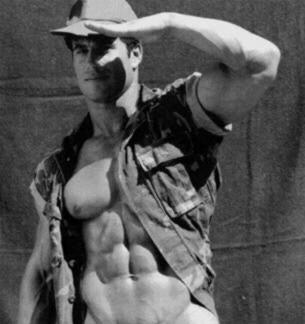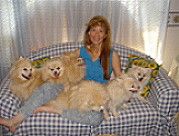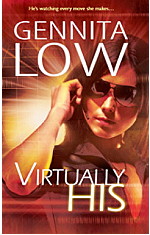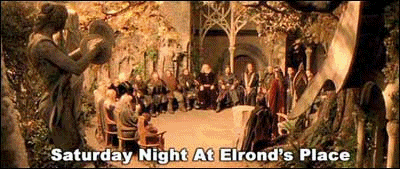I'm interested to know the difference between a paranormal and a scifi romance. Can someone give me definitions? I've read reviews where one is a paranormal romance and another book is a scifi romance...are they being used interchangeably or are there differences of which I'm unaware?
I really love the whole paranormal genre or books with paranormal elements in them. This is probably due to growing up in a multi-cultural country with four main religions. I loved all the stories of gods and goddesses from the Hindu and Buddhist/Taoist religions and used to read Chinese comic books depicting love and adventure tales with these elements.
And of course, there are the ghost stories. The Malay pontianak, the Chinese kiongsi, all that weird scary stuff fired up my overworked imagination. When I discovered television had great scary movies (although I didn't speak English), it was the beginning of my love affair of stories in pictorial form.
Anyway, science fiction, to me, always involve all those weird things like big spiders invading some poor town, or the hero that grows smaller and smaller (that was one of the best scifi movie EVAH!), or a Star Trek-type story. So, how is that connected to a sci-fi romance? And how is that different from a futuristic? See? This genre/cross-genre stuff is confusing.
Then here I am, writing a book with cutting edge technology that borders on sci-fi for those who don't care to read science magazines, so would my book be called sci-fi romance too? If a writer uses technology that's available now and pushes it a bit further along, would that make it a futuristic? But it's set in the present, with present day stuff happening, so... ??? And no, it's not an alternate universe either because the labs I write about do exist in the UNIVERSITIES that have been given funds to explore the science of virtual reality and what it could do. But some people still might not believe it, even with articles and research material piled up like a mountain in my living room.
Sure, some of the elements in my story are still theoretical but that's why it's fun to write about it! If readers who reject anything "para"normal in their books pick up, let's say, Christina Skye's newest SEALs stories, with her version of genetically-improved soldiers, would they call that a futuristic? A sci-fi romance? Granted, they might point out that the books don't have a lot of "science" in the story and my new book, sort of, does. So, does that mean, just because I attempt to explain how the virtual reality and bio-chemical serum work side by side, that means I'm writing sci-fi romance?
Argk. More coffee, please.
I know I've been teasing you about the commandos and Hell all these months. Well, it's definitely more fun than writing and explaining to you how the CAVE works ;-). I leave that to the COMCEN BLOG because I think it's more appropriate there. And yes, yes, before you complain that COMCEN hadn't explained about it, let me explain that I have ELEVEN MONTHS before my next book comes out and timing in giving out details is very important ;-).
But back to the science fiction, science theory, and a little bit more than science into woowoo territory discussion. I've never been afraid of trying out something new. SEALs not acting like SEALs in the CIA. CIA vs CIA red tape. Sexual manipulation in relationships. Bring it on. Everyone wants to write about the Super Soldier theme. Well, here's my version but hey, my version happens to be a woman who became the Super Soldier Spy. And there is a reason for it and I have to make the reader believe that it's not all woo-woo, that the training brought on the woo-woo.
By woo-woo, I mean anything in science fiction that pushes the readers to suspend their disbelief. In paranormals, of course it's the magical aspects in the stories, usually some kind of power the heroine possesses that would save the world. In futuristics, that same thing too, set in different "worlds," with a lot more action (think Angela Knight, yumyum).
The thing is, writing science fiction involves the same suspension of disbelief. Sci-fi readers appear to question the science theories more, that's all. One of my favorite science fiction book is still Ray Bradbury's The Illustrated Man, and yeah, at the time I read it years ago, the worlds he wrote about sounded surreal (rockets that take passengers?) but when I reread his book today, I see so many of his fascinating theories having come into fruition.
So I might be straddling territories again. It's the research nerd in me, I suppose. When I had the idea of virtual reality in my new stories, of course I dove deep into research to find out what's happening out there. Since I write about spies, of course I check out the military usage of virtual reality science. And then I dug deeper. And then I ask myself, how do I use this science to spy, if it's possible at all? And if it's possible, with all the right science gadgets that I've gathered and thrown at my Los Alamos friend for discussion and possible usage, what kind of person, with what skills, can do this?
Yes, I was in search of my own NEO. And it turned out that he is a she. Hell, with all the right genetic makeup. Hell, who must discover herself how far she can go. But by bringing up NEO from the Matrix, I'm already calling up images of woowoo stuff in your head, aren't I? So all right, yeah, Hell IS special. She has a special talent and she'd been trained to use it.
Let's say you have a latent musical talent but had never truly learned how to write music, but you can still compose songs on the piano...that's what I mean when I say that Hell has a special talent. She has "something," and virtual reality plus this something plus brainwaves synchronization have produced something new. It's MY theory ;-). And that's about as woowoo as oh, Albert Einstein waking up one morning, lying there with his tousled hair, and thinking, "Huh, I'm a mass at rest. And my thought can be considered energy, so Newton is wrong, goshdarnit! Why E = mass...hmm, lemme get up and work on this theory..."
;-)
Have I warned you that I think too much? There's a reason why I'm a roofer, you know.....
P/S. Lest there's any confusion, Edited to add: I don't think I'm writing sci-fi. Virtually His is, at heart, a spy love story.
And, for staying with me through this morning's nonsense, here's your reward! Hehee. 
VIRTUALLY HERS UPDATE
To read & comment on the poll (left column), click HERE. Thank you for all the wonderful posts there!
UPDATE: I SOLD THE SERIES TO SAMHAIN!
Here's your UBER VIRTUALLY HERS YAK THREAD!
GLow Twitter
Follow The Glow
Some readers having browser problems with the Google Followers Widget still. For now, you can still follow me through your Blogger Dashboard.
Wednesday, June 14, 2006
Uber Spy Author Gets Virtually Scary
Posted by
Gennita
at
7:59 AM
![]()
Subscribe to:
Post Comments (Atom)























5 comments:
I believe that sci fi has more technology in it whereas paranormal is stuff that cannot be explained. Like ghosts and shit like that. Technology even if it does not make sense to everyone does actually have a meaning something that normal people can grasp onto that oh yeah i could do that if i wanted too. Whereas paranormal is vampires and ghosts which people can't learn to see or hear. So it is considered something that could never happen. You might notice though that mediums and such are more open well science has come more in their favor so they are not as critisized as they once were. For although normal people can't do it. Science can explain it. Now trying to say that a vampire exists? that's a different story. And futuristic? Thoughts that take place in the future. Yours is present simply because your ideas are in the now, not something that might happen in the future but WILL happen in the future. Or at least more commonly. ~Athena
Hmm, Sci-fi for me is Star Treck kind of stories: spaceships on other planets...there's probably more to it but that's what it brings to my mind so I'm not very receptive.
I like paranormal books about mediums or people with similar powers. I'm not attracked by the vampire trend (at least in books, I was after all, following Buffy in her adventures).
As for futuristic, how far in the future qualifies? Eve and Rourke stories are futuristic but easy to believe. Right now I'm readin Linda Howard's Killing time. The stoty happens in 2005 but the heroine comes from the future, so what is it?
See, I'm not qualified to give you definitions. For me there are usually 3 categories : I don't like, I like and I looooove *s*
And, OMG, that movie about the guy getting smaller, I remember that! Didn't he go into a fog and started shrinking?
Wow, I had totally forgotten about this one!
Athena said it well, but I'd add that futuristics are less technology based; they're the romance version of science fantasy/space opera. They make assumptions about advances in technology, but they don't really explore how those advances affect the characters; what's important is the Adventure/Romance. Think Star Wars (science fantasy) vs. 2001: A Space Odyssey (science fiction).
IMO, your SSS books would be sci-fi romance because, as you noted, some elements are still theoretical, and it apparently explores the technology's effects through/on the romance.
Oooh, thank you, Athena, Kathleen, Laur, and SQ, for taking the time to answer my questions! I think I get a better feel of the genre when I read your comments, even from someone like Laur, who has a better definition--like, don't like, LOVE ;-).
Hey Laur,
That was The Incredible Shrinking Man. Wasn't that a KEWL movie? I watched it when I was probably 10 or 12 and I still remembered it for the longest time. I caught it on Scifi channel about four or five years ago. Of course I rewatched it!
SQ,
Hot commandos, check. Random explosion, hmm...how about random action scene? Check!
The subservient chicken--watch him tap dance!!!!
I don't know how the rest of the world defines it, but I have the Mary Stella interpretation for my own reading choices.
If the action takes place on a planet other than Earth, or the Earthbound action involves beings from another planet, it's sci-fi. (Unless it's wizards and faeries and that ilk from other planets, in which case, it's fantasy.)
If the action takes place on Earth with characters that aren't completely human, or that have psychic or magical abilities, then it's paranormal. *vbg*
Except for Nora Roberts books that involve ghosts, faeries, witches or murder mysteries that take place in 2059. Nora is her own category -- or her own many categories. *vbg*
This might not make sense to anyone else but me, but I get it.
Post a Comment